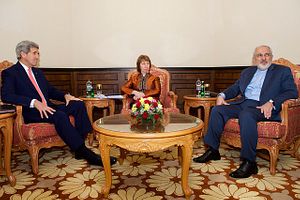The world is currently awaiting the final outcome of negotiations over Iran’s nuclear program, and concerns are not in short supply. Talks are the easy part – the real challenge will begin when a deal is made and ready to be implemented.
As policymakers and the international community continue to ponder all sorts of future scenarios, previous nuclear disarmament negotiations provide solids guides for the future. Here, we present four lessons from past nuclear disarmament negotiations to keep in mind as the deal with Iran moves forward.
Implementation can never be guaranteed.
In 2002, eight years after the agreement between Washington and Pyongyang where North Korea promised to freeze its nuclear weapons, U.S. intelligence alleged that the country was still pursuing a program in secret and the deal subsequently broke down.
No deal can craft perfect oversight. The best the international community can do, as suggested by Joel Wit, who was the U.S. official in charge of implementing the 1994 deal with North Korea, may well be to create dispute resolution mechanisms to handle a situation where allegations of cheating arise.
Inspections and oversight mechanisms are important, but they can never guarantee implementation. A country that really wants to cheat on a nuclear deal will always find ways of doing so.
Speed matters.
Some voices want to take it slow with Iran, but that might just kill any deal that is in the making. For example, Libya stopped sending shipments of its enriched uranium to Russia for disposal in 2009 because it believed that the positive changes it had been promised weren’t forthcoming.
Though the Western world first praised Libya for giving up its nuclear weapons, relations weren’t normalized in practice, or at least not fast enough. Similarly, in the North Korean case, though the country was promised that relations with the U.S. would be normalized, concrete steps never followed and the agreement ultimately failed.
In Iran’s case, both its people and its leaders may be expecting that economic relations with the West and others to recover immediately once sanctions are lifted. But lifting sanctions takes time, and many sanctions on Iran are in place for reasons other than its nuclear program.
Moreover, banks and other businesses tend not to rush into a country as soon as sanctions are removed as it’s often unclear precisely what is still illegal and what isn’t. Ultimately, ensuring that the Iran deal survives may be a matter of managing expectations, clear communication to the market, and both parties following up on their side of the bargain. A nuclear deal may end up failing if benefits come too slow.
The roots of nuclear ambitions run deeper than the programs.
No country starts a nuclear program on a whim. In the case of North Korea, nuclear ambitions were spurred by a history of constant invasions by neighbors and faraway countries alike. Both World War II and the Korean War taught the regime that it needs a strong deterrent to survive.
Similarly, Iran’s nuclear ambitions are decades in the making. Iran’s mistrust of the West and opposition to U.S. influence and intervention in the region goes back decades. In places like Iraq, Syria, Yemen, Lebanon and Gaza, where Iran continues to fund terrorist groups and deploy its elite Revolutionary Guard, this mistrust has led to action.
There is no doubt that economic sanctions have made these costly operations more difficult to sustain. However, sanctions have not removed Iran’s underlying mistrust or fears of regime change by Western intervention. That Tehran does not renege on its nuclear commitments, as North Korea did, will largely hinge on Iran’s ability to turn over a new leaf. Decisions to move towards acquiring nuclear weapons have strong historical roots that don’t go away just because a deal is made.
The left hand doesn’t always know what the right hand is doing.
Understandings between heads of state are one thing, agreements between nations are another. This is especially true for nuclear deals with autocratic states, where political battles between factions are opaque and can take unforeseen turns.
In North Korea, for example, it is believed that the armed forces, the ruling Worker’s Party, and the state bureaucracy often work in opposing directions, with the army generally taking a harder line on issues like nuclear negotiations. It is sometimes unclear who has the upper hand, and power dynamics change frequently.
Similarly, several reports have surfaced about how hardliners in Iran are all but pleased with the agreement. In a much more transparent but yet related manner, 47 Republican senators have warned that a deal may be cancelled by a future administration or Congress.
Deals are not contracts. While both parties may have made the current framework for a future deal in good faith, neither the U.S. nor Iran can guarantee its survival in the current political environment.
It is far too early to say with any certainty whether this will be a good deal or a bad deal. Still these four lessons give cause for caution. Past negotiations show us that a successful nuclear disarmament deal is built on far more than the deal itself; something policymakers often forget. This time could be different, but if history is any guide, the road ahead will be anything but smooth.
Terry Rydz and Benjamin Katzeff Silberstein are M.A. Candidates in International Relations and International Economics at the Johns Hopkins Paul. H. Nitze School of Advanced International Studies.

































